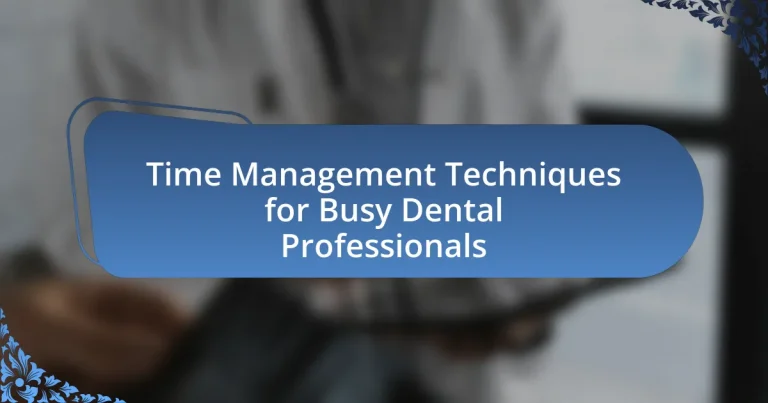Time management techniques are essential for busy dental professionals to enhance productivity and improve patient care. Key strategies include prioritization of tasks, effective scheduling using digital tools, delegation of administrative duties, and leveraging technology such as practice management software. These techniques address common challenges like scheduling conflicts and varying treatment times, ultimately leading to reduced stress and increased operational efficiency. Research indicates that implementing structured time management can significantly boost patient satisfaction and retention rates, making it a critical component for the success of dental practices.

What are Time Management Techniques for Busy Dental Professionals?
Time management techniques for busy dental professionals include prioritization, scheduling, delegation, and the use of technology. Prioritization involves identifying urgent tasks and focusing on high-impact activities, which can enhance productivity. Scheduling, through tools like digital calendars, allows dental professionals to allocate specific time slots for patient appointments, administrative work, and continuing education, ensuring a balanced workload. Delegation of tasks, such as administrative duties to staff, frees up time for dental professionals to concentrate on patient care. Additionally, leveraging technology, such as practice management software, streamlines operations and reduces time spent on manual processes. These techniques are supported by studies indicating that effective time management can lead to improved efficiency and reduced stress in clinical settings.
How do these techniques help improve productivity in dental practices?
Time management techniques significantly enhance productivity in dental practices by streamlining workflows and optimizing appointment scheduling. These techniques, such as prioritizing tasks, utilizing digital tools for scheduling, and implementing efficient patient flow strategies, reduce downtime and ensure that dental professionals can focus on patient care. For instance, studies show that practices employing digital scheduling systems can increase patient throughput by up to 30%, allowing for more appointments in a given timeframe. Additionally, effective task prioritization helps dental teams allocate their time to high-impact activities, thereby improving overall operational efficiency and patient satisfaction.
What specific challenges do dental professionals face regarding time management?
Dental professionals face several specific challenges regarding time management, including patient scheduling conflicts, varying treatment times, and administrative tasks. Patient scheduling conflicts arise when patients cancel or reschedule appointments, leading to gaps in the schedule that disrupt workflow. Varying treatment times complicate planning, as procedures can take longer than anticipated, affecting subsequent appointments. Additionally, administrative tasks such as paperwork, billing, and insurance claims consume valuable time that could be spent on patient care. These challenges collectively hinder the efficiency of dental practices and impact overall productivity.
How can effective time management lead to better patient care?
Effective time management leads to better patient care by allowing dental professionals to allocate sufficient time for each patient, ensuring thorough examinations and treatments. When practitioners effectively manage their schedules, they can reduce patient wait times, which enhances patient satisfaction and trust. Studies indicate that practices with optimized time management report higher patient retention rates and improved health outcomes, as patients receive timely interventions and follow-ups. For instance, a survey published in the Journal of Dental Education found that 85% of patients felt more satisfied when their appointments were well-organized and timely, directly correlating effective time management with enhanced patient care quality.
Why is time management crucial for dental professionals?
Time management is crucial for dental professionals because it directly impacts patient care, operational efficiency, and overall practice success. Effective time management allows dental professionals to allocate sufficient time for each patient, ensuring thorough examinations and treatments, which enhances patient satisfaction and outcomes. According to a study published in the Journal of Dental Education, practices that implement structured time management strategies report a 20% increase in patient throughput and a significant reduction in appointment cancellations. This demonstrates that prioritizing time management not only improves the quality of care but also contributes to the financial health of the practice.
What impact does poor time management have on a dental practice?
Poor time management negatively impacts a dental practice by leading to decreased productivity and increased patient dissatisfaction. When dental professionals fail to allocate time effectively, they may experience longer wait times for patients, resulting in frustration and potential loss of clientele. A study published in the Journal of Dental Education found that practices with efficient scheduling systems reported a 20% increase in patient retention rates compared to those with poor time management. Additionally, inefficient use of time can lead to increased stress among staff, which may further affect the quality of care provided.
How can time management techniques reduce stress for dental professionals?
Time management techniques can significantly reduce stress for dental professionals by allowing them to prioritize tasks effectively and allocate their time efficiently. By implementing strategies such as scheduling appointments, setting deadlines, and breaking tasks into manageable segments, dental professionals can minimize the feeling of being overwhelmed. Research indicates that effective time management leads to improved productivity and reduced anxiety levels, as professionals can focus on patient care without the distraction of looming deadlines or unfinished tasks. For instance, a study published in the Journal of Dental Education found that dental students who utilized time management strategies reported lower stress levels and higher academic performance, demonstrating the direct correlation between organized time management and reduced stress in a dental setting.
What are the most common time management techniques used in dentistry?
The most common time management techniques used in dentistry include scheduling, prioritization, delegation, and the use of technology. Scheduling involves creating a structured appointment calendar to optimize patient flow and minimize downtime. Prioritization allows dental professionals to focus on high-impact tasks, ensuring that urgent patient needs are addressed promptly. Delegation involves assigning specific tasks to dental assistants or hygienists, which enhances efficiency and allows the dentist to concentrate on more complex procedures. The use of technology, such as practice management software, streamlines administrative tasks and improves communication, further enhancing time management. These techniques are essential for maintaining productivity and ensuring high-quality patient care in a busy dental practice.
How does prioritization of tasks enhance efficiency in a dental office?
Prioritization of tasks enhances efficiency in a dental office by ensuring that critical procedures and patient needs are addressed first, leading to optimized workflow and reduced wait times. By categorizing tasks based on urgency and importance, dental professionals can allocate resources effectively, minimizing downtime and maximizing patient throughput. Research indicates that effective task prioritization can lead to a 20-30% increase in productivity in healthcare settings, as it allows staff to focus on high-impact activities that directly contribute to patient care and satisfaction.
What role does scheduling play in effective time management for dental professionals?
Scheduling is crucial for effective time management among dental professionals as it allows for the organized allocation of time to various tasks and patient appointments. By implementing a structured schedule, dental professionals can optimize their workflow, reduce patient wait times, and ensure that all necessary procedures are completed within the workday. Research indicates that practices with well-defined scheduling systems experience a 20% increase in productivity, as they can better manage patient flow and minimize downtime. This structured approach not only enhances operational efficiency but also improves patient satisfaction, as timely appointments lead to a better overall experience.
How can dental professionals implement these techniques effectively?
Dental professionals can implement time management techniques effectively by prioritizing tasks using the Eisenhower Matrix, which categorizes activities into four quadrants based on urgency and importance. This method allows dental professionals to focus on high-priority tasks that directly impact patient care and practice efficiency. Research indicates that effective prioritization can lead to a 25% increase in productivity in clinical settings. Additionally, utilizing scheduling tools and software can streamline appointment management, reducing gaps and optimizing patient flow. Implementing these strategies not only enhances time management but also improves overall patient satisfaction and practice profitability.
What tools and resources are available to assist with time management?
Various tools and resources available to assist with time management include digital calendars, task management apps, and time tracking software. Digital calendars like Google Calendar allow users to schedule appointments and set reminders, enhancing organization. Task management apps such as Trello and Asana enable users to prioritize tasks and collaborate with team members, improving workflow efficiency. Time tracking software like Toggl provides insights into how time is spent, helping professionals identify areas for improvement. These tools are widely used in various industries, including dental practices, to streamline operations and enhance productivity.
Which software solutions are best for managing appointments and tasks?
The best software solutions for managing appointments and tasks include Acuity Scheduling, Calendly, and Todoist. Acuity Scheduling allows users to automate appointment bookings and send reminders, which can significantly reduce no-show rates. Calendly integrates seamlessly with various calendar systems, enabling efficient scheduling without back-and-forth communication. Todoist offers task management features that help prioritize and organize daily responsibilities effectively. These tools are widely recognized for their user-friendly interfaces and robust functionalities, making them ideal for busy dental professionals who need to optimize their time management.
How can mobile apps support time management in a dental practice?
Mobile apps can significantly enhance time management in a dental practice by streamlining scheduling, patient communication, and task management. These applications allow dental professionals to efficiently manage appointments, reducing scheduling conflicts and optimizing patient flow. For instance, features like automated reminders can decrease no-show rates, which studies show can be as high as 30% in dental practices. Additionally, mobile apps facilitate real-time communication with patients, enabling quick updates and reducing the time spent on phone calls. Task management features within these apps help dental teams prioritize daily activities, ensuring that essential tasks are completed on time. Overall, the integration of mobile apps into dental practices leads to improved efficiency and better time management.
What are some best practices for maintaining effective time management?
Effective time management can be maintained by prioritizing tasks, setting specific goals, and utilizing scheduling tools. Prioritizing tasks involves identifying urgent and important activities, which helps in focusing on what truly matters. Setting specific goals, such as SMART (Specific, Measurable, Achievable, Relevant, Time-bound) objectives, provides clarity and direction. Utilizing scheduling tools, like digital calendars or task management apps, enhances organization and accountability. Research indicates that professionals who implement structured time management techniques experience increased productivity and reduced stress levels, as evidenced by a study published in the Journal of Occupational Health Psychology, which found that effective time management correlates with improved job performance and well-being.
How can regular reviews of time management strategies improve outcomes?
Regular reviews of time management strategies can significantly improve outcomes by identifying inefficiencies and optimizing task prioritization. By systematically evaluating current practices, dental professionals can pinpoint areas where time is wasted, allowing for adjustments that enhance productivity. Research indicates that professionals who engage in regular self-assessment and reflection on their time management techniques report a 25% increase in efficiency, as they can adapt their strategies to better align with their workload and patient needs. This continuous improvement cycle fosters a more organized approach, ultimately leading to better patient care and reduced stress levels among dental professionals.
What tips can dental professionals follow to stay organized and focused?
Dental professionals can stay organized and focused by implementing effective time management techniques such as prioritizing tasks, utilizing digital tools for scheduling, and maintaining a clutter-free workspace. Prioritizing tasks allows dental professionals to focus on high-impact activities first, which enhances productivity. Digital tools like practice management software streamline appointment scheduling and patient records, reducing time spent on administrative tasks. Additionally, a clutter-free workspace minimizes distractions, enabling dental professionals to concentrate better on patient care. Research indicates that organized environments can lead to improved efficiency and reduced stress levels, supporting the effectiveness of these strategies.


